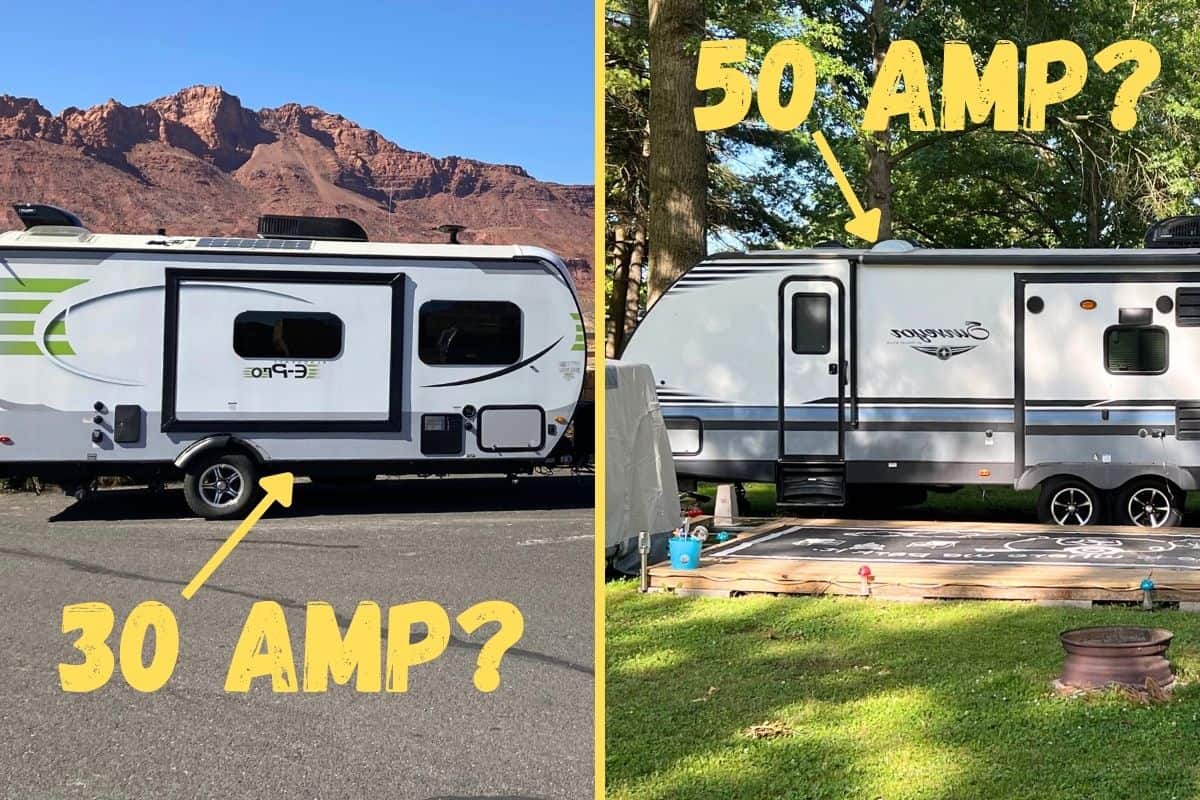Are you wondering if your travel trailer is 30 or 50 amps? If so, you’re not alone, as this is a question that many beginner RVers have.
So to answer the question “Are travel trailers 30 or 50 amp“, we wrote this blog post.
The quick answer is that some travel trailers are 30 amp, while others are 50 amp. To figure out whether you have a 30 or 50-amp RV, however, make sure to keep reading. Because we’re about to demystify this whole RV amp situation.
In this RV guide, we’ll discuss the ins and outs of 30 and 50-amp RV systems, break down their differences, help you identify what your RV has, and dive into the pros and cons of each setup.
By the time you finish reading, you’ll be an amp expert and ready to tackle any campground hookup with confidence.
Understanding Electrical Systems in Travel Trailers
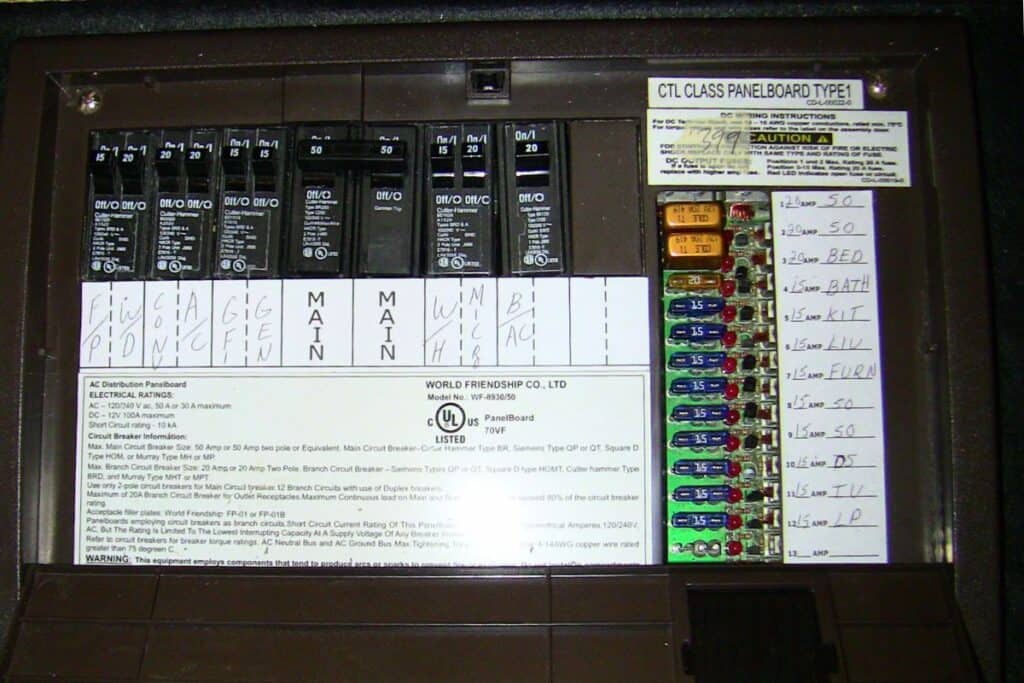
Before we dive into the nitty-gritty of 30 vs 50-amp RV systems, it’s important to have a basic understanding of travel trailer electrical systems.
At its most basic, your travel trailer’s electrical system is designed to power all your onboard appliances, lights, and gadgets. This includes everything from your fridge and microwave to your TV and phone charger. Unlike your house though, which is always connected to the grid, your RV needs to be flexible. It might be plugged into a campground’s power one day and running off batteries the next.
When we talk about travel trailers being “30 or 50 amp,” we’re referring to the maximum amount of electrical current the RV can safely handle.
But why does this matter? Well, the amperage of your system determines how many appliances you can run simultaneously without tripping a breaker. It’s the difference between having to choose between running your air conditioner or your microwave and being able to run both at the same time.
Understanding your RV’s electrical system isn’t just about convenience, though. It’s also about safety. Because using too many high-draw appliances on a system that can’t handle the load can lead to overheating, damaged wiring, or even electrical fires.
So, are travel trailers 30 or 50 amps?
The fact is, they can be either – and knowing which one you have (or need) is key to a smooth, stress-free RV experience.
What’s the Difference Between 30 Amp & 50 Amp?
Alright, let’s break down the big question: what’s really the difference between 30-amp and 50-amp systems in travel trailers?
First off, an amp (short for ampere) is a unit that measures electrical current. Think of it like water flowing through a pipe – the more amps, the more electrical “flow”. Because of this, a 50 amp system can handle more electrical current than a 30 amp system.
But here’s where the rubber meets the road. A 30 amp RV plug has three prongs and provides a single 120-volt, 30 amp service. Do a little math (120 volts x 30 amps), and you’ll find that a 30-amp service can deliver up to 3,600 watts of power.
Now, let’s look at the 50-amp RV plug. It’s got four prongs and provides two separate 120-volt currents. This means you’ve got two lines, each capable of delivering up to 120 volts. Crunch those numbers (120 volts x 50 amps x 2), and you’ll see that a 50 amp service can provide up to a whopping 12,000 watts of power!
Here’s a quick comparison:
- 30 amp system: 3,600 watts
- 50 amp system: 12,000 watts
That’s more than three times the power available in a 50 amp system compared to a 30 amp system.
But what does this mean in practical terms? With a 30 amp system, you might be able to run an air conditioner and a few small appliances at the same time. But fire up the microwave while the AC is running, and you might trip a breaker.
A 50-amp system, on the other hand, gives you much more flexibility. You could potentially run two air conditioners, a microwave, and several other appliances all at once without breaking a sweat (or a circuit).
Are Most Travel Trailers 30 or 50 Amp?
When it comes to “Are travel trailers 30 or 50 amp?”, the answer isn’t as straightforward as you might think. While both options exist, there’s definitely more of one type than the other.
Generally speaking, more travel trailers are 30 amps than 50 amps. This setup is more common, especially in smaller to mid-size travel trailers.
The RV industry, however, is constantly changing, and we’re seeing more and more 50-amp travel trailers hit the market. These are typically larger models or luxury trailers packed with power-hungry amenities.
Let’s break it down with some factors that influence whether a travel trailer is 30 or 50 amp:
- Size matters: Smaller travel trailers (think 30 feet or less) are more likely to be 30 amp. They usually don’t need the extra power a 50 amp system provides.
- Amenities: Travel trailers with dual air conditioners, a residential fridge, or a washer/dryer combo will typically have a 50-amp system due to the greater power required by these amenities.
- Age: Older travel trailers are more likely to be 30 amps, as they often have fewer power-hungry appliances and amenities.
- Intended use: Trailers designed for occasional use or basic camping often have 30 amps. Those built for full-time living or luxury camping tend to have 50 amps.
- Price point: Budget-friendly models usually come with 30 amp systems, while higher-end trailers usually have 50 amp setups.
30 Amp Travel Trailers
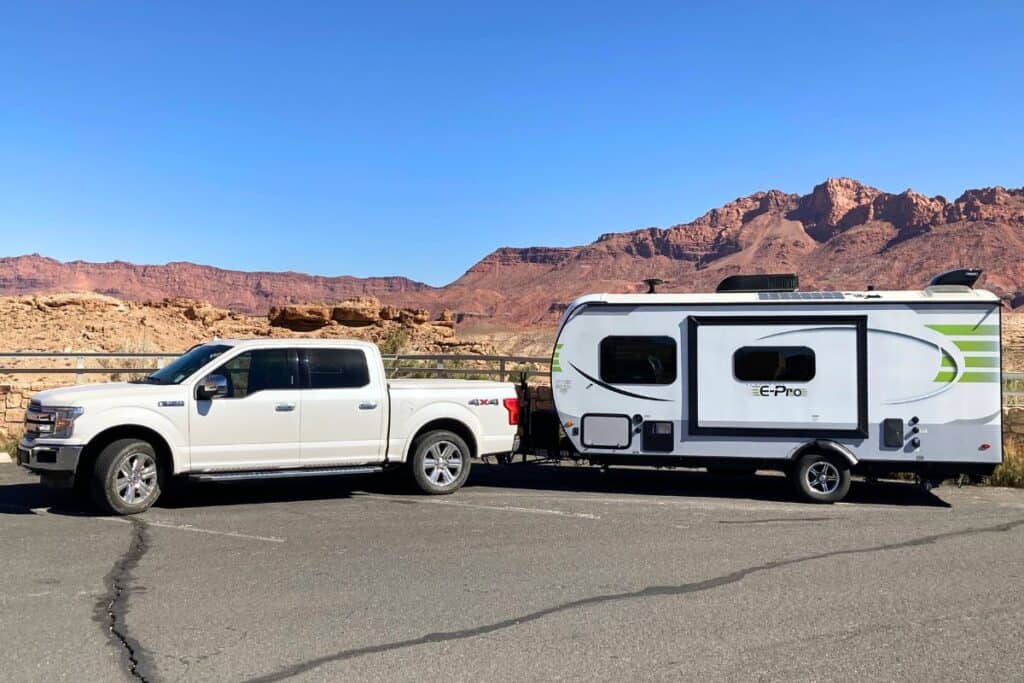
Whether you’re wondering “Is my camper 30 or 50 amp?” or just curious about what a 30 amp trailer can handle, we’re about to unpack everything you need to know about the power capability of these popular campers.
Travel Trailer 30 Amp Power: What Can It Handle?
When it comes to travel trailer 30 amp power, it’s all about understanding the limits and making smart choices. So, what exactly can a 30-amp system handle? Let’s break it down.
To start, remember that a 30-amp service provides up to 3,600 watts of power (120 volts x 30 amps). This might sound like a lot, but it can get used up quicker than you’d think in an RV. Here’s a rundown of what you can typically run on a 30-amp system:
- Air Conditioner: Most RV air conditioners draw about 1,500 to 2,000 watts when running. This is often the biggest power hog in your trailer.
- Refrigerator: An RV fridge usually uses 400 to 1,000 watts.
- Microwave: Expect around 1,000 to 1,500 watts when in use.
- Water Heater: If electric, it’ll draw about 1,500 watts.
- Lights and Smaller Appliances: These use relatively little power, usually less than 100 watts each.
Now, here’s the catch with travel trailer 30 amp power; you can’t run all these things simultaneously. If you tried to run your AC, microwave, and water heater at the same time, you’d likely trip a breaker. Because of this, it’s all about balancing your power usage.
For example, you could run your AC and fridge together, or your microwave and a few lights. But fire up that hair dryer while the AC’s running, and you might find yourself in the dark! This is where the art of power management comes in.
It’s also worth noting that not all appliances draw their maximum power all the time. Your fridge, for instance, cycles on and off, so it’s not constantly using 1,000 watts.
So, is a travel trailer 30 amp setup enough? For many campers, absolutely! It can handle most basic needs with a bit of thoughtful usage.
Pros & Cons of 30 Amp RVs
When it comes to travel trailer 30 amp power, there’s a lot to consider. So let’s break down the pros and cons to help you decide if a 30 amp camper is right for you.
Pros:
- Cost-effective: 30 amp campers are generally less expensive.
- Lightweight: The components for a 30 amp system are typically lighter, which can help keep your overall trailer weight down.
- Simplicity: With fewer components and simpler wiring, 30-amp systems are easier to understand and troubleshoot.
- Widely available: Most campgrounds offer 30 amp hookups, making it easy to find campsites.
- Energy consciousness: The power limitations can encourage more mindful energy use, which can be great for boondocking.
Cons:
- Limited power: You’ll need to juggle large appliance usage to avoid overloading the system.
- Less future-proof: As RV appliances become more power-hungry, a 30-amp system might become limiting.
- Potential for frequent breaker trips: If you’re not careful with power management, you might find yourself resetting breakers often.
- Cooling limitations: Running multiple air conditioners simultaneously is usually not possible on a 30-amp system.
How to Tell if a Travel Trailer is 30 Amp
Identifying whether you’ve got a 30-amp travel trailer is easier than you might think. Below are the easiest ways to tell.
- Check the Power Cord: The easiest way to identify a 30 amp travel trailer is by looking at its power cord:
- It will have three prongs arranged in a triangular pattern
- It typically will have a twist-lock feature for a secure connection
- Inspect the Power Inlet: Look at where you plug in your RV at the campground. A 30-amp travel trailer will have a power inlet that matches the plug described above.
- Circuit Breaker Panel: Open your RV’s electrical panel. A 30 amp system will have a 30 amp main breaker.
- Review Your Owner’s Manual: Consult your RV’s manual, it should clearly state if you have a 30 amp power system.
- Count the Air Conditioners: 30 amp systems typically support fewer high-draw appliances. If your RV has a single air conditioner it’s probably 30 amp.
- Look for a Converter/Inverter Rating: Your RV’s power converter will usually be rated for the amperage of your system. A 30 amp converter in your rig is a clear sign you’re dealing with a 30 amp travel trailer.
- Consult the Dealer or Manufacturer: Reach out to your dealer or RV manufacturer with your model information. They can confirm whether you have a 30-amp or a 50-amp camper.
50 Amp Travel Trailers
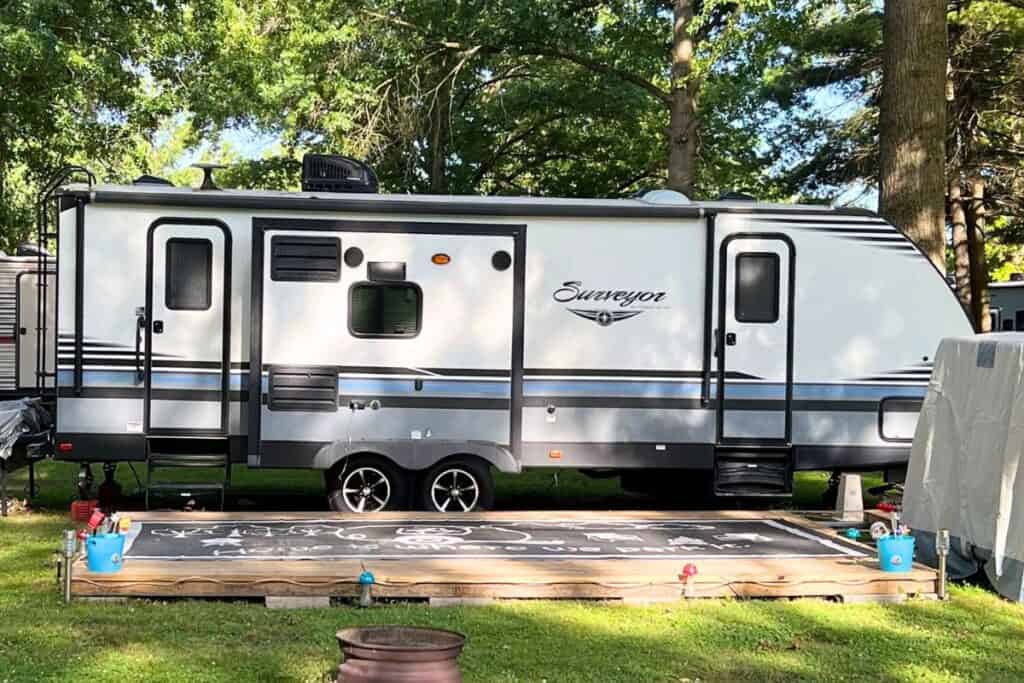
Now that we’ve explained 30-amp campers, let’s shift gears to 50-amp travel trailers.
When Do You Need a 50 Amp RV?
Are you wondering if you need to upgrade to a 50-amp RV? Or are you shopping for a new rig and trying to decide between a 30 amp vs a 50 amp camper?
If this sounds like you, this is the section for you, as we’ve broken down when a 50-amp RV is the best choice.
- Larger RVs: If you’re eyeing a spacious travel trailer or fifth wheel, especially one over 35 feet, it’s likely to come with a 50 amp system.
- Multiple Air Conditioners: Planning to camp in sweltering climates? If your RV has two or more air conditioning units, you’ll almost certainly need a 50 amp setup to run them simultaneously.
- Residential-Style Appliances: Love the idea of a full-size refrigerator, washer/dryer combo, or a convection oven in your RV? These home-like appliances often require the extra juice a 50-amp system provides.
- Entertainment Systems: If your ideal camping trip includes a large TV, gaming consoles, and a bumping sound system, a 50 amp setup will better support your entertainment needs.
- High-Power Usage: Want to run the microwave, air conditioner, and hair dryer at the same time without tripping a breaker? A 50-amp system gives you this flexibility.
- Full-Time RVing: For those who live in their RV year-round, a 50-amp system often provides the power needed to maintain a comfortable, home-like environment.
- Future-Proofing: If you’re unsure about your future needs, a 50-amp RV gives you room to grow. It’s easier to add power-hungry appliances later, like a second air conditioner, if you already have the electrical capacity.
- Boondocking with Large Battery Banks: A 50 amp system can more efficiently charge large battery banks when you do have access to shore power.
Pros & Cons of 50 Amp RVs
When considering whether to go for a 30 amp vs 50 amp camper, it’s important to weigh the pros and cons. So let’s break down the advantages and disadvantages of 50 amp systems.
Pros:
- More Power: The most obvious benefit is the increased electrical capacity. With 12,000 watts available, you can run multiple high-draw appliances simultaneously.
- Flexibility: No more juggling appliance usage. You can run your air conditioner, and microwave, and charge your devices all at once without worry.
- Support for Luxury Amenities: Want a residential fridge, washer/dryer, or multiple TVs? A 50-amp system can handle these power-hungry luxuries.
- Future-Proofing: As RV technology advances, a 50 amp system ensures your rig can keep up with newer, more power-demanding appliances or features.
- Faster Charging: When hooked up to shore power, a 50 amp system can charge large battery banks more quickly, which is great for boondocking.
Cons:
- Higher Cost: 50 amp systems are more expensive and typically on more expensive RVs.
- Added Weight: The components of a 50 amp system are heavier, which can impact your overall trailer weight and towing capacity.
- Less Common at Campgrounds: While many RV parks offer 50 amp hookups, they’re not as common as 30 amp connections. Because of this, you might need to use an adapter in some locations to step your plug down to 30 amps.
- Complexity: With more power comes more complexity. Troubleshooting issues in a 50 amp system can be more challenging for DIY-minded RVers.
- Overkill for Some: If you’re a minimalist camper or weekend warrior, a 50 amp system might be more than you need, leading to unnecessary expense and weight.
How to Tell if a Travel Trailer is 50 Amp
Figuring out if you’re dealing with a 50-amp RV is important, especially when you’re hooking up at a campground.
Here’s how to recognize a 50 amp setup and answer the question, “Is my camper 30 or 50 amp?”
- The Power Cord: The easiest way to identify a 50 amp trailer is by looking at its power cord:
- It will have four prongs
- The plug will generally be larger and more robust than a 30-amp plug
- The Power Inlet: Look at your RV’s power inlet. A 50 amp inlet will match the four-prong configuration of the plug.
- Circuit Breaker Panel: Open your RV’s electrical panel. A 50 amp system will have a dual 50 amp main breaker.
- Appliances and Amenities: 50 amp travel trailers often come with more power-hungry features:
- Multiple air conditioners
- Residential-style refrigerators
- Washer/dryer units
- Larger entertainment systems
- RV Size and Type: Larger travel trailers, especially those over 35 feet, are likely to have 50-amp systems. Luxury fifth wheels almost always use 50 amp setups.
- Owner’s Manual: Check your RV’s manual, it should clearly state whether you have a 30-amp or 50-amp system.
- Consult the Dealer or Manufacturer: Contact your RV dealer or manufacturer with your model information and they can confirm your electrical setup.
- Converter/Inverter Rating: Your RV’s power converter will usually be rated for the amperage of your system. A 50 amp converter is a clear indicator of a 50 amp setup.
30 Amp vs 50 Amp: Making the Right Choice
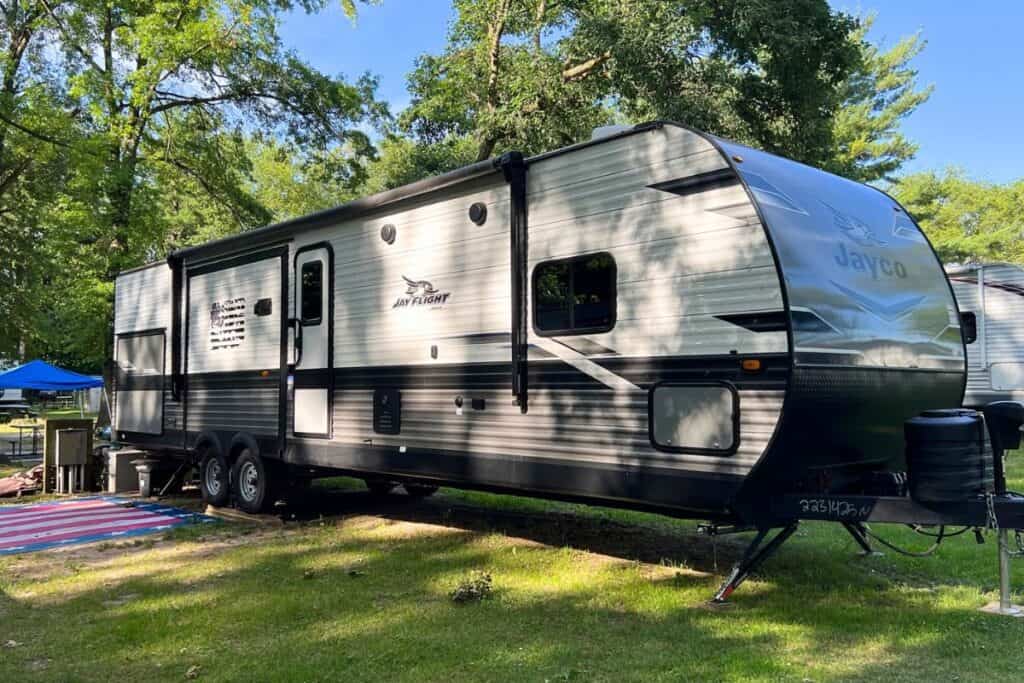
If you’re still wondering whether you should go with a 30-amp or 50-amp RV, this section should help you decide.
Factors to Consider When Choosing Between 30A and 50A Camper:
Size of the Travel Trailer
The size of the rig plays a significant role in determining your power needs. Smaller travel trailers (usually under 30 feet) often come with 30 amp systems and can function perfectly well with this setup. Larger trailers, especially those over 35 feet, typically require a 50-amp system to power everything.
For example, a compact 20-foot trailer with basic amenities might be perfectly suited to a 30-amp system. On the other hand, a 40-foot luxury fifth wheel with multiple slide-outs and high-end appliances will likely need a 50 amp setup.
Power Needs & Usage Habits
Consider your camping style and needs. Are you a minimalist camper who’s happy with basic amenities? Or do you prefer a home-away-from-home experience with all the modern conveniences?
If you’re content running a single air conditioner, using a standard RV refrigerator, and don’t mind managing your power usage, a 30 amp system might suit you fine. However, if you want to run multiple air conditioners simultaneously, use residential-style appliances, or power several appliances at once without worry, a 50 amp system is a better choice.
Camping Destinations & Available Hookups
Where you plan to camp can influence your choice between a 30 amp and 50 amp camper. While 30 amp hookups are more common, especially in older or more basic campgrounds, many modern RV parks offer 50 amp service.
If you plan to frequently camp in full-service RV resorts, a 50 amp system allows you to take full advantage of the available power. However, if you prefer state parks or more remote locations, you might find 30-amp hookups more prevalent.
It’s worth noting that you can always use an adapter or “RV dogbone” to connect a 50-amp RV to a 30-amp outlet, but you’ll be limited to 30 amps of power when you do so. Also, you can plug a 30 amp RV into a 50 amp outlet with an adapter, but you won’t be able to utilize the extra power even with the adapter.
Final Thoughts:
Remember, there’s no one-size-fits-all to the question “Are travel trailers 30 or 50 amp?” The right choice depends on your specific needs, preferences, and camping style.
Regardless of whether you choose a 30-amp travel trailer or opt for the extra power of a 50-amp camper, we hope this blog post has helped you understand RV power a little better.
Additional Travel Trailer Resources:
- Do Travel Trailers Have Generators? A Beginner’s Guide
- Are Travel Trailers Insulated for Winter? Find Out!
- This is How Much a 28 FT Travel Trailer Weighs (15 Examples)
Recent Posts
When cruising down the highway in your RV, the last thing you want is a tire blowout! Not only is it dangerous, but RV tire replacement isn't cheap, costing $200 to $300 per tire. The good news,...
Nothing ruins an RV adventure faster than a breakdown with no way to fix it. Because of this, every RVer should have a well-stocked RV tool kit for those unexpected roadside emergencies and campsite...

